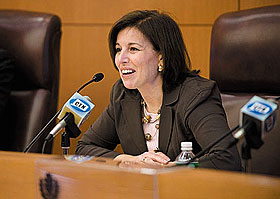  |
| HOME | THIS ISSUE | CALENDAR | GRANTS | BACK ISSUES | < BACK | NEXT > |
Experts weigh impact of technology, Internet on democracyby Scott Brinckerhoff - February 19, 2008
|
||||
| Government should follow the example of the online encyclopedia Wikipedia by tapping into the expertise of ordinary people, a New York Law School professor said during a UConn symposium on “e-democracy.” The Feb 7 event was sponsored by the Connecticut Public Interest Law Journal. The digital age and Internet are benefiting democracy but also bringing challenges, speakers agreed. Panel discussions at the UConn Law School event covered campaigning on the Web, the mechanics of voting, political speech, and the power of blogging. The keynote speaker, Professor Beth Noveck of New York Law School, described a “Wikipedia-like” project she has under way with the U.S. Patent Office. Its purpose is to use technology to improve the quality of information that patent examiners see before deciding whether to grant a patent. The idea behind the project, she said, is to allow experts on various subjects to “self-select” and weigh in on pending patents, in much the same way that people contribute to the online encyclopedia Wikipedia. Noveck said the Patent Office and the Environmental Protection Agency (EPA), to name just two Washington groups, tend to make decisions based on consultation with people who may not be the true experts. “We confuse professionalism with expertise,” she said. Governance and rule-making, she added, “should be split into smaller tasks to allow people to participate where they can and should; in other words, when participation fits with their skills, their know-how, and their passions.” The Patent Office has a significant backlog and often makes far-reaching decisions in only 18 hours, Noveck said. Patent examiners routinely use Google to research the science embodied in applications, coming up with a vast number of citations, but Noveck’s project focuses instead on inviting a “micro elite” to comment. “We don’t need 10,000 people participating in the work of the EPA, to decide on an issue about asbestos, or 10,000 people virtually trailing around a senator or congressman, overseeing their work,” she said. “We need a micro elite of self-interested collaborators.” Other speakers looked at the intersection of technology and democracy in a political context. The power of blogging was illustrated in a comment by Paul Schiff Berman, Jesse Root Professor of Law, during a panel discussion he moderated. Berman said one of the panelists, Tim Tagaris, who has served as internet director of two Connecticut-based political campaigns, had correctly predicted in his blog that Hillary Clinton’s campaign was in money trouble, days before that became common knowledge.
Tagaris’s insight, Berman said, stemmed from his observation that Clinton had mentioned her web site address in three consecutive speeches, an unusual comment for her. The reason, Tagaris surmised, was that she wanted people to log on and contribute. Tagaris, one of several internet professionals to discuss their work, said the online part of a campaign needs to complement the rest of the campaign, not be a substitute for it. Several speakers noted that some candidates seem more comfortable with the freewheeling environment of the Internet, while others are cautious. Democrats Ned Lamont and Howard Dean, respectively candidates for senator and president several years ago, fell into the comfortable category, said Diana Cohen, visiting assistant professor of government and law at Lafayette College. “They allowed open discourse to occur right on their web sites, even though they couldn’t control it,” she said. In today’s campaign, Barack Obama seems to be making more of a serious connection with voters on his web site than Hillary Clinton is on hers, said blogger Melissa Ryan of http://CTLocalPolitics.net and http://MyDD.com. Experts also recalled the 2000 presidential election and its aftermath in Florida, where voters learned for the first time about “chads” and “hanging chads.” This year, they agreed, chads won’t be a problem, but such technologies as scanners and touch screen computers may bring new ones. One expert said the new technologies are subject to both human error and viruses. State Sen. Gayle Slossberg (D) said the General Assembly is closely watching how the new systems work, and will randomly audit results – in public – following the election. |
| ADVANCE HOME UCONN HOME |

